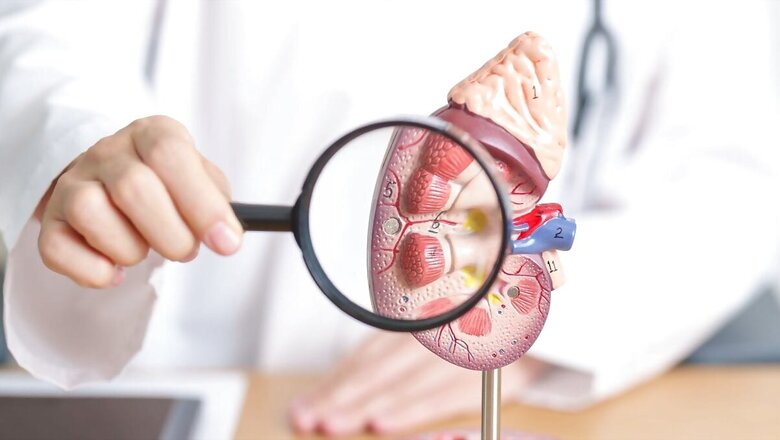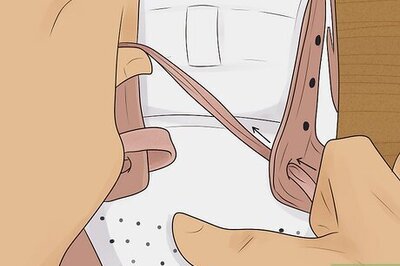
views
Kidney stones have plagued humanity for thousands of years, with evidence of their existence dating back to ancient Egyptian mummies from 7,000 years ago. Throughout history, these painful formations have affected people from all walks of life, including notable figures like Napoleon Bonaparte and Benjamin Franklin. The quest to understand and treat kidney stones has led to significant medical advancements, from the dangerous “cutting for stone” procedures of ancient times to today’s sophisticated dietary and medical interventions.
With this rich historical context in mind, understanding the role of diet in kidney stone prevention is essential.
According to Dr. P.S. Vali, Consultant Nephrologist and Head of the Department at the Asian Institute of Nephrology and Urology, Hyderabad, the following three foods should be avoided by individuals prone to kidney stones:
1. High-Oxalate Foods: Spinach
Spinach, despite being a nutritional powerhouse, is extremely high in oxalates, which can contribute to the formation of calcium oxalate stones—the most common type of kidney stone. While spinach offers many health benefits, its high oxalate content makes it problematic for those at risk of kidney stones. Alternative low-oxalate greens like kale or collard greens provide similar nutrients without the increased stone risk.
2. Sodium-Rich Foods
Excessive sodium intake significantly raises the risk of kidney stone formation. High sodium levels cause the kidneys to excrete more calcium into the urine, increasing the likelihood of stones developing. Common high-sodium foods to avoid include:
- Processed meats (deli meats, sausages, bacon)
- Canned soups and vegetables
- Salty snacks (chips, pretzels, crackers)
- Fast food and restaurant meals
- Condiments and sauces
Experts recommend limiting daily sodium intake to below 2,300 mg, or even lower at 1,500 mg for those with a history of kidney stones.
3. Animal Protein: Red Meat
Consuming excessive animal protein, especially red meat, can increase the risk of kidney stone formation. Animal proteins are high in purines, which can elevate uric acid levels in the body and contribute to uric acid stones. Additionally, a diet high in animal protein can make urine more acidic, creating an environment favorable for stone formation. Foods to limit include:
- Red meat (beef, pork, lamb)
- Organ meats
- Poultry
- Eggs
- Seafood
Instead, plant-based protein sources like beans, lentils, and tofu are recommended, as they are less likely to contribute to stone formation.
Personalized Prevention Strategies
Dr Anusha Gudipati, DNB Nephrology, Consultant Nephrologist, Asian Institute of Nephrology and Urology, Hyderabad, emphasizes that kidney stones can be prevented through simple diet modifications. Based on the type of kidney stone a person has experienced, they may be able to prevent future occurrences by adjusting their intake of sodium, animal protein, calcium, or oxalate in their diet.
If you’ve had calcium oxalate stones, consider avoiding or limiting:
- Nuts and nut products
- Peanuts (which are legumes and high in oxalate)
- Rhubarb
- Spinach
- Wheat bran
For those prone to uric acid stones, limiting animal protein is key. Avoid or reduce consumption of:
- Beef, chicken, pork, especially organ meats
- Eggs
- Fish and shellfish
- Dairy products like milk and cheese
General Diet Recommendations for Kidney Stones
In addition to specific food avoidance, Dr. Gudipati offers the following general dietary guidelines to prevent kidney stones:
- Drink plenty of fluids: At least 2.5 to 3 liters per day
- Limit foods high in oxalate
- Consume enough dietary calcium
- Avoid high salt intake
- Eat a moderate amount of protein
By adopting these dietary strategies, individuals at risk of kidney stones can significantly reduce their chances of developing them. However, staying well-hydrated and consulting with a healthcare professional or registered dietitian for personalized advice remains crucial in managing and preventing kidney stones.




















Comments
0 comment